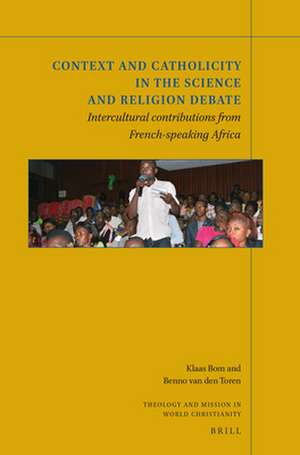Context and Catholicity in the Science and Religion Debate: Intercultural contributions from French-speaking Africa: Theology and Mission in World Christianity, cartea 14
Autor Klaas Bom, Benno van den Torenen Limba Engleză Paperback – 15 apr 2020
Din seria Theology and Mission in World Christianity
-
 Preț: 480.41 lei
Preț: 480.41 lei -
 Preț: 369.48 lei
Preț: 369.48 lei -
 Preț: 343.00 lei
Preț: 343.00 lei -
 Preț: 375.33 lei
Preț: 375.33 lei - 15%
 Preț: 388.79 lei
Preț: 388.79 lei - 7%
 Preț: 331.88 lei
Preț: 331.88 lei -
 Preț: 408.50 lei
Preț: 408.50 lei -
 Preț: 408.50 lei
Preț: 408.50 lei -
 Preț: 360.61 lei
Preț: 360.61 lei -
 Preț: 374.58 lei
Preț: 374.58 lei - 15%
 Preț: 394.16 lei
Preț: 394.16 lei -
 Preț: 392.19 lei
Preț: 392.19 lei -
 Preț: 343.00 lei
Preț: 343.00 lei -
 Preț: 362.79 lei
Preț: 362.79 lei -
 Preț: 343.10 lei
Preț: 343.10 lei -
 Preț: 367.22 lei
Preț: 367.22 lei -
 Preț: 343.10 lei
Preț: 343.10 lei -
 Preț: 337.08 lei
Preț: 337.08 lei -
 Preț: 407.46 lei
Preț: 407.46 lei -
 Preț: 336.19 lei
Preț: 336.19 lei -
 Preț: 337.08 lei
Preț: 337.08 lei -
 Preț: 331.43 lei
Preț: 331.43 lei -
 Preț: 375.07 lei
Preț: 375.07 lei -
 Preț: 376.95 lei
Preț: 376.95 lei - 15%
 Preț: 377.59 lei
Preț: 377.59 lei -
 Preț: 376.56 lei
Preț: 376.56 lei - 15%
 Preț: 397.68 lei
Preț: 397.68 lei
Preț: 374.09 lei
Nou
Puncte Express: 561
Preț estimativ în valută:
71.59€ • 74.29$ • 59.84£
71.59€ • 74.29$ • 59.84£
Carte indisponibilă temporar
Doresc să fiu notificat când acest titlu va fi disponibil:
Se trimite...
Preluare comenzi: 021 569.72.76
Specificații
ISBN-13: 9789004420281
ISBN-10: 9004420282
Dimensiuni: 155 x 235 mm
Greutate: 0.34 kg
Editura: Brill
Colecția Brill
Seria Theology and Mission in World Christianity
ISBN-10: 9004420282
Dimensiuni: 155 x 235 mm
Greutate: 0.34 kg
Editura: Brill
Colecția Brill
Seria Theology and Mission in World Christianity
Notă biografică
Klaas Bom, Ph.D., is assistant professor of Systematic Theology at the Protestant Theological University in Groningen (NL). He has published on Intercultural theology, theological anthropology, and Blaise Pascal.Benno van den Toren, Ph.D., is chair for Intercultural Theology at the Proestant Theological University in Groningen (NL).
Recenzii
This important work breaks new ground in the dialogue between science and religion by highlighting the neglect of cultural diversity within western discussions of this theme. Bom and Toren make excellent use of Donald Davidson’s critical tool of ‘triangulation’ in exploring the forms that science and religion take in Francophone Africa, and how these inform our understanding of how different culturally located communities perceive this dialogue. This is a vitally important corrective to the ethnocentric approaches that have dominated western thinking, and opens the way to a deeper and richer understanding of this important intellectual and cultural dialogue. — Alister McGrath, Andreas Idreos Professor of Science and Religion, University of Oxford
Bom and van den Toren have written a truly remarkable book; through their examination of how three French-speaking African societies understand the relationship between religion and science they add new insight to the age old debate between these two entities. In addition these scholars bring the best tools of social science to theology. In doing so they chart the way forward for a new field of intercultural theology. This is a book that should be read by theologians, social scientists, and anyone who cares about getting beyond tired westernized understandings of the relationship between religion and science. — Elaine Howard Ecklund, Herbert S. Autrey Chair in Social Sciences, Rice University
Through this book the Authors have explored many questions that keep arising in African Academia, pertaining to the conceptual, pedagogical and practical interaction between Religion and Science. The history of schooling in Tropical Africa (both Francophone and Anglophone) has been intertwined with the history of Christian missions colonial rule and struggles for national sovereignty. These processes coincided with " secularization" as process, and "secularism" as ideology. The book invites readers to reflect critically on the porous borders between "Religion" and "Science". Although the book focuses on research based in French-speaking African countries, the theme of the book remains relevant for the whole continent. Readers will find in the book many questions that need more answers, and many issues that require follow up. — Jesse N.K. Mugambi, Professor of Philosophy & Religious Studies, University of Nairobi, Kenya
Bom and van den Toren have written a truly remarkable book; through their examination of how three French-speaking African societies understand the relationship between religion and science they add new insight to the age old debate between these two entities. In addition these scholars bring the best tools of social science to theology. In doing so they chart the way forward for a new field of intercultural theology. This is a book that should be read by theologians, social scientists, and anyone who cares about getting beyond tired westernized understandings of the relationship between religion and science. — Elaine Howard Ecklund, Herbert S. Autrey Chair in Social Sciences, Rice University
Through this book the Authors have explored many questions that keep arising in African Academia, pertaining to the conceptual, pedagogical and practical interaction between Religion and Science. The history of schooling in Tropical Africa (both Francophone and Anglophone) has been intertwined with the history of Christian missions colonial rule and struggles for national sovereignty. These processes coincided with " secularization" as process, and "secularism" as ideology. The book invites readers to reflect critically on the porous borders between "Religion" and "Science". Although the book focuses on research based in French-speaking African countries, the theme of the book remains relevant for the whole continent. Readers will find in the book many questions that need more answers, and many issues that require follow up. — Jesse N.K. Mugambi, Professor of Philosophy & Religious Studies, University of Nairobi, Kenya
